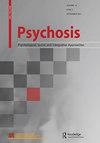What can experimental studies tell us about paranoia and anxiety? A systematic review with implications for theory and clinical practice
IF 1
4区 医学
Q4 PSYCHIATRY
Psychosis-Psychological Social and Integrative Approaches
Pub Date : 2021-07-06
DOI:10.1080/17522439.2021.1909112
引用次数: 2
Abstract
ABSTRACT Background Psychosis is one of the most disabling and costly long-term conditions, and treatment outcomes remain modest. Interventions focused on specific symptoms, such as paranoia, show promise and typically target cognitive and behavioural maintenance processes. Anxiety is implicated in theories of paranoia; however, the nature of the relationship remains unclear. We review experimental studies of paranoia and anxiety against existing cognitive models. Method A systematic review strategy identified experimental studies assessing levels of anxiety and paranoia. Papers were assessed for quality, and data relating to samples, measures, designs and key findings were extracted and narratively synthesised. Results Nineteen studies met criteria for the review. Most found that manipulations impacting anxiety also impacted paranoia, with preliminary evidence for a causal relationship. The overall quality of the research was weak. Discussion We recommend a research agenda to confirm initial evidence for the causal role of anxiety in increased paranoia, and whether targeting affect, in addition to cognitive and behavioural maintenance processes, improves outcomes in clinical groups and those at risk of psychosis.关于妄想症和焦虑症,实验研究能告诉我们什么?具有理论和临床意义的系统综述
摘要背景精神病是最致残和最昂贵的长期疾病之一,治疗效果仍然不理想。针对特定症状的干预措施,如妄想症,显示出希望,通常针对认知和行为维持过程。焦虑与妄想症理论有关;然而,双方关系的性质仍不清楚。我们回顾了针对现有认知模型的妄想症和焦虑症的实验研究。方法采用系统回顾策略确定评估焦虑和偏执水平的实验研究。对论文的质量进行了评估,并提取了与样本、测量、设计和关键发现有关的数据,并进行了叙述性综合。结果19项研究符合审查标准。大多数人发现,影响焦虑的操作也会影响偏执狂,有初步证据表明存在因果关系。研究的总体质量很差。讨论我们建议制定一项研究议程,以确认焦虑在妄想症增加中的因果作用的初步证据,以及除了认知和行为维持过程外,靶向影响是否能改善临床组和精神病风险组的结果。
本文章由计算机程序翻译,如有差异,请以英文原文为准。
求助全文
约1分钟内获得全文
求助全文
来源期刊
CiteScore
2.20
自引率
8.30%
发文量
36

 求助内容:
求助内容: 应助结果提醒方式:
应助结果提醒方式:


